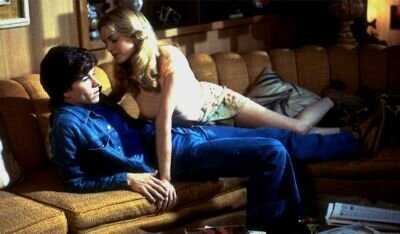|
|
| Tookey's Review |
|
| Pro Reviews |
|
| Mixed Reviews |
|
| Anti Reviews |
|
| Cast |
|
| |
 |
| |
| Released: |
1997 |
| |
|
| Genre: |
DRAMA
OVERRATED
|
| |
|
| Origin: |
US |
| |
|
| Colour: |
C |
| |
|
| Length: |
152 |
|
| |
|
| |
|
|
| |
|
|
Life and times of a Seventies porn star (Mark Wahlberg).
|
Reviewed by Chris Tookey
|
|
This black comedy about the 1970s porn industry was hailed variously as the new GoodFellas (Martin Scorsese’s warts-and-all expose of the Mafia) or the new The Player (Robert Altman’s spoof of Hollywood). For good measure, its 26 year-old writer-director Paul Thomas Anderson was touted as “the new Tarantino”.
The film offers one insight into the porn industry - that it offers a surrogate family to people with no family of their own. Eddie Adams (Mark Wahlberg) is a 17 year-old dishwasher seduced into the industry by its spurious “glamour” and willing women. Under the name Dirk Diggler, he finds fame not because of any acting talent but thanks to his teenage stamina and prodigious physical equipment. Predictably, he starts to believe his own publicity, takes to drugs and breaks with his Svengali and father-protector, Jack Horner (Burt Reynolds).
Horner may be a no-talent pornographer, but in the porn world he passes for an artist. “It is my dream,” he pontificates, “to make a film that is true, that’s right, that’s dramatic.”
Over the course of the film, we see his pretensions become increasingly absurd, until he becomes a pathetic figure, working on his most despised medium - video - and picking young men off the street to have sex in the back of his limo with his surrogate daughter. Reynolds plays the part with just the right, fragile dignity, as a money-grubbing pimp who can’t even live up to the comically low standards he’s set himself.
Horner’s leading lady Amber Waves (Julianne Moore) is far from bright, and tearfully estranged from her own son; consequently, she acts as a mother-figure to those around her. However, she’s such a dysfunctional parent, introducing her surrogate son to cocaine and condoning her surrogate daughter’s self-destructive sex sessions, that any pity one feels for her loss of her real son is offset by the knowledge that she would be a terrible influence.
An unusual feature of the movie is that, although the acting’s pretty good, there’s practically no audience involvement. It’s hard to know if we’re meant to laugh at Dirk and his pals because they’re so dumb, or sympathise because they’re so vulnerable.
Because of the movie’s detachment, it’s fatally weightless. Take one of the subsidiary characters, a porno stage-manager called Little Bill, played (rather well) by William H. Macy. There’s a running gag about him constantly walking in on his wife making love to some other man, and being rebuked by his wife for embarrassing her. Eventually, the laughter is meant to freeze on our faces as Little Bill takes bloody revenge, before blowing his own brains out.
Well, fine - except that Bill’s killings have no effect whatsoever on the other characters. It doesn’t make them question their way of life, their values, or the effects of their activities on the people around them.
Like all the big action set-pieces (there are three bloodbaths in all), the event just seems calculated to appeal to those who are in the market for a post-Tarantino massacre. It’s symptomatic of the movie’s superficiality that, just when it could have become most searing and emotional, it opts instead for cheap sensation.
Anderson crams in so many sub-plots - there are at least four more which I haven’t room to mention - that he hasn’t time to delve deep into people’s backgrounds or motivation. And the plot is so shapeless and sprawling that it resembles a TV mini-series more than a movie.
So is Boogie Nights any good? It’s lively, energetic and shows unmistakable signs of directorial talent. So did Anderson’s first, more reflective film, Hard Eight . There are some brilliant scenes, it’s full of authentic detail, and I was never bored. Despite a lot of bad language and worse behaviour, Boogie Nights is not pornography. On the contrary, it’s very unerotic and - relatively - free of nudity.
But, at two and a half hours, it is - like its leading man’s physical equipment - grotesquely overlength. It strives to be satire, but ends up as a sneer. Eager to poke fun at the dress-sense of the Seventies, it‘s something of a fashion victim itself. It’s so cool, hip and non-judgmental - those ominous buzz-words of fashion-led, Nineties film-reviewing - that it offers a disappointingly twee, sanitised view of the world it describes.
How can this be an authentic depiction when it steers clear of mentioning such well-documented characteristics as sexually transmitted diseases, the intimidation of actresses, the industry’s underpinning by organised crime? What kind of a film waxes nostalgic about 70s porn while ignoring its adverse effects on society, or its subsequent growth into a multi-billion dollar business?
Yes, Boogie Nights is a promising piece of directorial apprentice-work. But it’s also a glib, cynical, exploitation picture, with less emotional depth than a novel by Jacqueline Susann.
|
|
|
|
|
